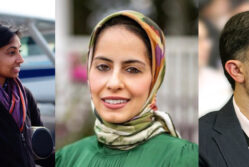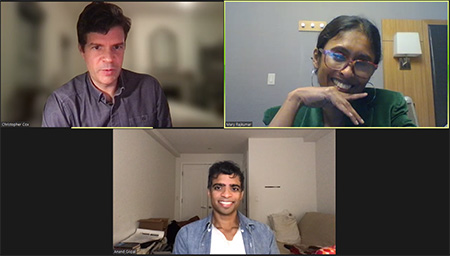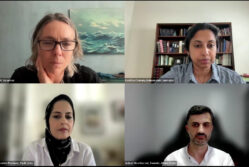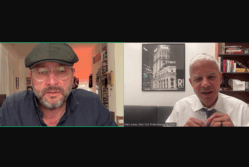Archive Event Highlight

‘How I Did It’: Anand Gopal Shares Insights on Award-Winning Work
by Chad Bouchard
Before award-winning journalist and author Anand Gopal pitched his first story to Harper’s magazine, he had been reporting in Libya and Egypt during the Arab Spring in 2011 and 2012. He decided he wanted to do some work in Syria.
“At that point in the Syrian conflict, most of the territories on the Turkish border were under the control of the Syrian regime, so it was tricky getting in,” he said.
Gopal had previously met with an editor at Harper’s, Christopher Cox, following a recommendation from a colleague, Matthieu Aikins, who would later win the OPC’s 2014 Ed Cunningham Award for coverage of Syria for the news site Matter, as well as a 2015 Citation for Excellence in the same category for reporting on Pakistan for Harper’s. But Gopal didn’t want to pitch a story before he knew whether he would be able to cross the border and what he would find once there.
“So I went to Turkey and hung out for a while. I met some Syrians who had fled, and other Syrian activists, and eventually went across the border with them,” he said. He ended up in the town of Taftanaz, the site of a massacre at the hands of the Bashar al-Assad regime.
“So now I knew I had a pitchable story. So when I left Syria, that’s when I wrote to Chris [Cox].”
On Feb. 15, the OPC hosted a program with Gopal, a four-time OPC Award winner and a club member who is currently a writer for The New Yorker magazine, in conversation with Cox, as the two revealed insights about their process of working together, the elements of a strong pitch, safety concerns and other reporting issues. The program was part of the OPC’s “How I Did It” series pairing reporters with their editors and producers to discuss exceptional work.
The moderator was Mary Rajkumar, a governor of the OPC and the international investigations editor for The Associated Press.
She asked Cox how it was for him as an editor to work on a story after the reporting had already been done.
“It’s very unusual for a pitch to arrive after the reporting is done,” Cox said. “So I knew we had to work with only what he had seen when he was there. But he had seen a lot.”
Cox said “in an ideal world” that it is good to be able to do follow-up interviews and other reporting after a pitch, but it wasn’t possible under the circumstances. He said Harper’s accepted the pitch Gopal sent based on his “vivid, descriptive writing,” and the two started talking about the structure and outline of the story.
Gopal agreed that it was unusual to do reporting before a pitch, and “probably not to be recommended. I have to say a lot of journalists in those years ended up going in and getting kidnapped” or killed. “So I prefer to talk things through beforehand. And typically that’s what I’ve done.”
Rajkumar asked what Gopal looks for in the stories he wants to pitch. He said he tries to write about strong characters and narrative arcs that “have a beginning, middle and end.”
Cox, who is now an editor at New York Magazine after working for GQ and The New York Times Magazine, said pitches that usually catch his eye are ones that seem like they could sustain longform storytelling, including a strong arc and characters “to keep it aloft,” as well as some assurances that the writer will be able to complete the story, logistically and in the quality of their writing.
“Even in a casual email, I’m looking at the language a little bit,” he said. And in a pitch email “it’s the moment to showcase your command of arresting details, good use of concrete language. It’s probably not the time to let loose with your most beautiful, florid prose but you definitely want to show that you know your way around a sentence.”
Gopal also wrote a story for Harper’s with Cox as editor about U.S.-backed Afghan police use of torture and executions in Kandahar.
Rajkumar asked Gopal how he was able to interview Afghan women for his New Yorker piece, The Other Afghan Women.” which won the OPC’s 2021 Ed Cunningham Award.
He had lived in Afghanistan for three years from 2008 to 2011, and made friends with a taxi driver. Gopal said he would sit in the back of the taxi while they drove out into the countryside, and the driver would start conversations with passengers about the war while he listened.
“The things that I would hear really shocked me and changed my perceptions. Women were saying all sorts of things about wanting the troops out and hating what the Americans were doing.”
That experience formed the basis of his story. In 2021, around the time the U.S. withdrawal was announced, he connected with contacts he knew in southern part of the country and began interviewing their grandmothers.
“Restrictions [on women] in southern Afghanistan are pretty rigid, except when it comes to elderly women,” he said. He introduced himself over Skype remotely first, and then when he was on the ground in some cases they spoke with relatives in the room, or through a partition. Those initial interviews led to contacts with others, including younger women, leading to more than 30 interviews for the piece.
Cox asked Anand about the tone of the Harper’s piece about the massacre in Syria, where despite the violence he detailed there were hopeful moments in the writing, including quotes from those resisting the Assad regime. He asked Gopal if he would change anything, knowing what we know now about worsening conditions since 2012.
Gopal said the piece reflects what many Syrians were feeling at the time, with a hopeful imagining of a different future. “Both of these things were happening simultaneously. Horrible death and destruction, and a political flourishing,” he said.
Gopal is currently writing a book about a city in Syria that overthrew the government and embarked on an 18-month experiment in democracy after surviving four decades of dictatorship.
“I’m driven by people’s attempts to imagine different ways of living, because I think we need that,” he said. “And Chris, talking about your question of hope – whereas the war is a sober assessment of what our country’s role has been, whether looking at failed democracy experiments or successful ones, is adjusted towards how we can try to have a little bit of hope in what a lot of us agree are kind of dark times.
Gopal’s other three stories that won the OPC’s Ed Cunningham Award were another for The New Yorker, “Syria’s Last Bastion of Freedom,” one in The Atlantic, “The Hell After ISIS”, and one in The New York Times Magazine with Azmat Khan titled “The Uncounted.”
Click the window below to watch a playlist of clips from the program.
Related Events




